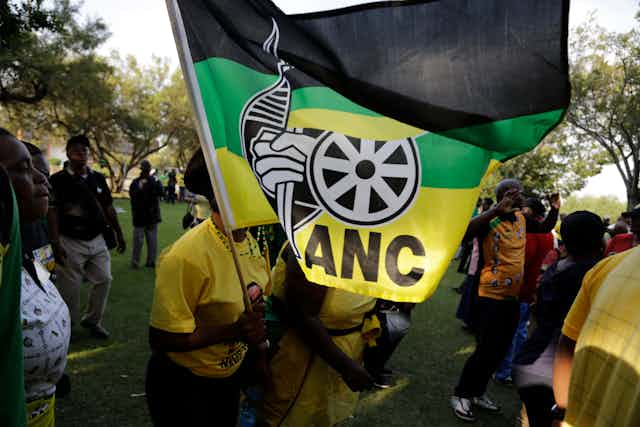No political party can govern forever. In democracies with free and fair elections, no political party has been in power longer than half a century. So is the African National Congress (ANC), the party that governs South Africa, at least halfway through its first term in power?
It has already won more elections than the historic liberation movements in India and Ireland did after independence. That these countries were always multi-party democracies makes their histories relevant to South Africa.
Politics Professor Joleen Steyn Kotze’s new book, Delivering an Elusive Dream of Democracy: lessons from Nelson Mandela Bay is timely. It makes a natural companion volume with Crispian Olver’s How to Steal a City.
Steyn Kotze provides analysis through an academic frame while Olver has written a civil servant’s empirical narrative.

Steyn Kotze’s book details studies of how an ANC-run metropolitan municipality, Nelson Mandela Bay Municipality in the Eastern Cape, constantly deteriorated in the delivery of basic services, such as water and electricity, because of funds being squandered on tender corruption.
Olver’s book dissects how a criminal syndicate used a corrupt faction of ANC politicians to divert public funds to itself.
These are haunting facts on the fragility of political parties. They remind us that integrity and democracy are not destinations. They must be lifelong commitments that we ceaselessly strive for.
Coalitions
Nelson Mandela Bay has been run by a coalition since the 2016 local government elections. The first coalition government – led by the Democratic Alliance (DA) – recently collapsed in acrimony. A new one has been formed led by an executive mayor from the United Democratic Movement, a party with only 2% electoral support in the area.
Coalitions across the world range from the stable to the fragile. In Bavaria, the coalition between the Christian Social Union and the Christian Democratic Union remains strong after an astonishing six decades.
By contrast, the DA coalition in Nelson Mandela Bay unwound within two years. And its fragile minority rule in Tshwane and Johannesburg survive without a coalition, but only on tactical voting support from the Economic Freedom Fighters (EFF).
The DA holds onto power in the two metropolitan councils solely by the grace of the EFF.
At their best, coalitions can ensure stability in a situation where no party won over half the votes. If two parties can compromise on their policies, each of their voters will get a significant part of what they support.
At worst, a cumbersome coalition can be hostage to the most extremist small member in it, with nasty ethnic or religious consequences. Or the smaller partner can crudely demand as a condition of coalition a share of the spoils: posts; tenders for its election donors; or real estate deals.
If coalitions are unstable, or if there are hung councils as there are Beaufort West, Oudtshoorn, and Lebanon, a city or country can suffer paralysis while potholes proliferate, rubbish piles up uncollected in the streets, or sewage works crumble.
But the demands of coalition politics isn’t the only factor pulling at the fabric of South Africa’s political parties. Factionalism looms large for both large parties. In the DA there are disagreements over affirmative action and Black Economic Empowerment policies. In the ANC patronage factions are making themselves felt in Kwa-Zulu Natal in particular.
The challenge for their national leaderships is how they manage the tensions.
What next
Both coalitions with and against the ANC, and factionalism within the ANC and the main opposition party the Democratic Alliance (DA), will clearly rank as important in the country’s 2019 general elections.
What are the prospects for the new ANC-led coalition in Nelson Mandela Bay?
Early signs are that the problems identified by Steyn Kotze and Olver haven’t gone away. The ANC could easily slide back into corruption, with the country seeing a continuation of what Steyn Kotze describes as
the degeneration of the ANC through the loss of its moral stature, the erosion of its integrity and the public disillusionment with its performance.
This suggests that the ANC may slip even further in next year’s elections. Other factors that point to electoral slide is the fact that the party continues to shoot itself in the electoral foot by choosing non-sensical policy positions.

Take its shift from rainbow non-racialism to using a hierarchical concept of affirmative action and Black Economic Empowerment. To the sizable Coloured majority of voters in the northern areas of Nelson Mandela Bay, this lends credence to the complaint: under apartheid we were not white enough; under affirmative action we are not black enough. It wasn’t enough for the ANC to have put up a Coloured sports celebrity, Danny Jordaan, as their mayoral candidate.
This means that, as history has proven elsewhere, parties in democracies where there are free and fair elections don’t rule forever. Nelson Mandela Bay will offer a fascinating test of the two books’ analysis in the country’s elections next year.
Joleen Steyn Kotze: Delivering an Elusive Dream of Democracy: Lessons from Nelson Mandela Bay. Stellenbosch. African Sun Media. 2018. Crispian Olver. How to Steal a City. Jonathan Ball & Amazon. 2017.

